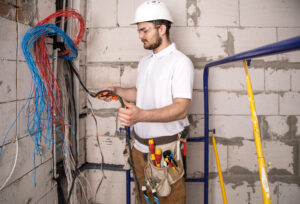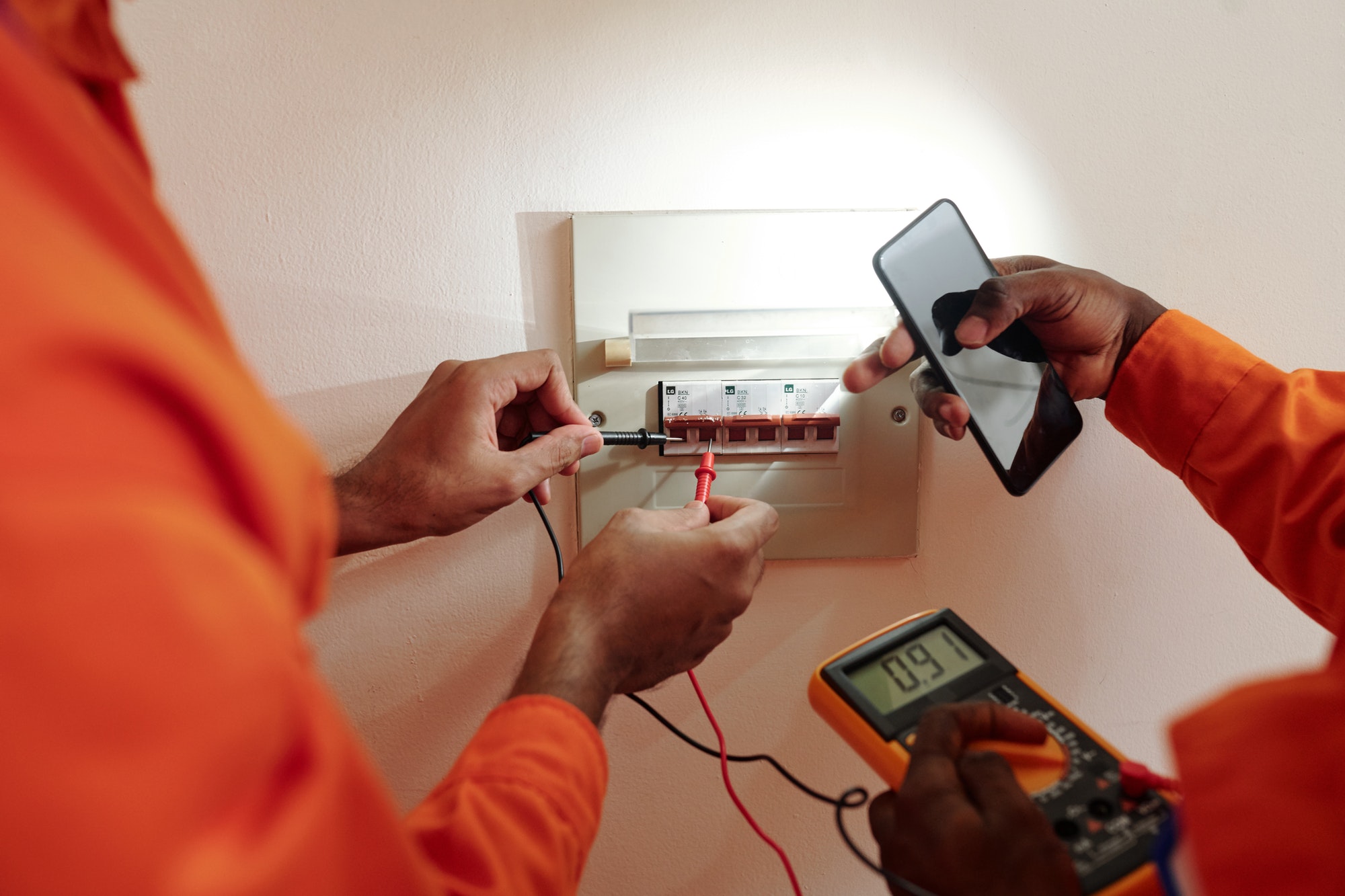Did you know that a staggering 40% of electrical fires in commercial properties are caused by faulty wiring or equipment?Meeting the electrical requirements is not just important – it’s crucial. But navigating through the complex world of electrical regulations can be overwhelming, especially if you’re not familiar with the intricacies involved.
In this comprehensive guide, we will walk you through everything you need to know about meeting electrical requirements for your commercial property in London. From understanding the different types of certifications and permits required to ensuring proper installation and maintenance practices, we’ve got you covered. We’ll also provide valuable tips on finding qualified electricians and reputable suppliers who can help meet your specific needs.
So whether you’re starting a new venture or looking to upgrade your existing space, this guide will equip you with the knowledge and resources necessary to ensure compliance with electrical regulations while keeping your business safe from potential hazards.
Key Takeaways
- Understanding the electrical requirements for commercial properties is crucial for London businesses to ensure compliance and safety.
- Proper planning of electrical installations is essential to meet the specific needs of a commercial property and avoid potential issues in the future.
- Prioritizing electrical safety measures is necessary to protect employees, customers, and the property itself from electrical hazards.
- Obtaining Energy Performance Certificates (EPCs) is important for London businesses to assess and improve their energy efficiency, which can lead to cost savings.
- Familiarizing oneself with the landlord legal framework is essential to meet legal obligations and avoid penalties related to electrical requirements.
- Regular compliance checks and maintenance of electrical systems are vital to ensure ongoing safety, efficiency, and compliance with regulations.
- Following best practices in installations, such as using qualified professionals and high-quality materials, can help businesses achieve reliable and long-lasting electrical systems.
- A thorough professional selection process for electrical contractors is necessary to ensure competence, reliability, and adherence to regulations.
- Enhancing EPC ratings through energy-efficient measures can not only reduce environmental impact but also attract potential tenants, improve property value, and lower operational costs.
Understanding Electrical Requirements
There are a few key factors to consider. First and foremost, you need to determine the specific needs of your business operations. This will help you plan the installation process accordingly and ensure that all electrical systems meet your requirements.
Assessing the existing electrical infrastructure is also crucial. You should evaluate whether any upgrades or modifications are needed to accommodate your business’s electrical demands. This may involve increasing the capacity of your current system or installing additional outlets and circuits.
Safety testing is another important aspect of meeting electrical requirements. Regularly conducting safety tests helps ensure compliance with electrical regulations and keeps everyone in your commercial property safe. It’s essential to schedule periodic inspections by qualified professionals who can assess the condition of your electrical systems and identify any potential hazards.
Keeping detailed records of safety tests and inspections is vital for documentation purposes. These records serve as evidence that you have taken appropriate measures to maintain a safe environment in accordance with legal requirements.
If you’re a landlord, it’s crucial to understand your responsibilities regarding electrical safety in commercial properties. As a landlord, you have an obligation to provide tenants with necessary information about electrical safety measures they should follow while using their rented space.
Landlords must ensure that all electrical installations within their properties are safe and meet legal requirements. This includes hiring qualified electricians for installations, repairs, or maintenance work when needed.
Planning Electrical Installations
There are several important factors to consider. One of the key aspects is project execution. It’s crucial to plan and execute electrical projects in a systematic and organized manner.
To ensure smooth project execution, you should coordinate with contractors, electricians, and other professionals involved in the project. This collaboration will help ensure that everyone is on the same page and working towards a common goal. By monitoring progress regularly, you can identify any potential issues or delays and take appropriate action to keep the project on track.
It’s also essential to complete the work within the specified timeframe. Delays can be costly and disrupt your business operations. Therefore, staying vigilant about timelines is crucial for meeting your electrical requirements efficiently.
Another vital aspect of planning electrical installations is hiring professionals who are licensed and experienced in handling such projects. Before hiring electricians or contractors, verify their qualifications, certifications, and track record to ensure they have the necessary expertise for your specific needs.
Requesting references from previous clients can give you valuable insights into their reliability and level of expertise. Positive feedback from satisfied customers indicates that they have successfully completed similar projects before.
Electrical Safety for Commercial Properties
Meeting electrical requirements is crucial. One essential step in this process is obtaining an Electrical Installation Condition Report (EICR). This report assesses the condition of your electrical system and identifies any potential hazards or non-compliance issues.
By obtaining an EICR, you can gain valuable insights into the safety of your electrical installations. The inspection process conducted by a qualified electrician will thoroughly examine all aspects of your system, including wiring, sockets, switches, and distribution boards. Through this assessment, any existing faults or defects can be identified.
Once you have received the EICR report, it is important to carefully review its recommendations. The report may highlight areas that require immediate attention or suggest improvements to enhance safety and compliance with local building codes. Taking necessary actions based on these recommendations is vital to ensure the well-being of everyone within your commercial premises.
In addition to meeting electrical requirements, gas safety compliance should also be a priority for businesses operating in London. Alongside regular checks for electrical systems, it is essential to comply with gas safety regulations by conducting routine inspections carried out by qualified engineers.
Maintaining proper documentation of gas safety certificates is equally important as it ensures legal compliance and provides evidence that necessary measures have been taken to protect occupants from potential risks associated with gas installations.
To summarize:
- Obtain an EICR report: By getting an Electrical Installation Condition Report (EICR), you can assess the safety of your electrical system.
- Review recommendations: Carefully review the recommendations provided in the EICR report and take necessary actions accordingly.
- Comply with gas safety regulations: Ensure regular gas safety checks are conducted by qualified engineers.
- Maintain documentation: Keep proper records of gas safety certificates for legal compliance purposes.
Energy Performance Certificates
To ensure that your commercial property in London meets the necessary energy performance requirements, it is important to understand and comply with Energy Performance Certificates (EPC). An EPC provides information about a building’s energy efficiency, helping businesses make informed decisions regarding their energy consumption.
Obtaining a valid Energy Performance Certificate is crucial for demonstrating the energy efficiency levels of your building. This certificate rates your property on a scale from A to G, with A being the most efficient and G being the least efficient. The certificate also includes recommendations for improving energy performance.
By displaying the EPC prominently in your premises as required by law, you not only comply with regulations but also provide transparency to visitors and potential tenants or buyers. This allows them to assess the environmental impact of occupying or investing in your commercial space.
Improving your EPC rating can have several benefits for both cost savings and environmental sustainability. By implementing energy-efficient measures, such as upgrading lighting systems, insulation, and heating/cooling equipment, you can significantly reduce your energy consumption. These improvements not only lower utility bills but also contribute to reducing greenhouse gas emissions.
Consider incorporating renewable energy sources into your property to further enhance its overall energy efficiency. Installing solar panels or utilizing geothermal systems are examples of renewable technologies that can help offset carbon emissions while providing clean and sustainable power.
Familiarize yourself with Minimum Energy Efficiency Standards (MEES) regulations applicable to commercial properties in London. MEES require buildings to meet minimum standards of energy efficiency before they can be leased or sold legally. It is essential that you ensure your commercial property complies with these standards by taking necessary actions if it falls below the required level.
Landlord Legal Framework
As a landlord in London, it is crucial to understand the legal framework that governs meeting electrical requirements for commercial properties. Two key aspects of this framework are health and safety laws and the Landlord and Tenant Act.
Health and Safety Laws
Complying with health and safety laws related to electrical installations is essential for ensuring the well-being of your employees, customers, and visitors. It is your responsibility as a landlord to provide a safe working environment.
To meet these obligations, you should regularly review and update safety policies. This includes conducting periodic inspections of electrical systems to identify any potential hazards or issues. By staying proactive in maintaining electrical safety standards, you can prevent accidents or injuries caused by faulty wiring or equipment.
For example, if an Energy Performance Certificate (EPC) indicates that improvements are needed in your property’s electrical system, it is important to address those issues promptly. This not only ensures compliance with health and safety laws but also demonstrates your commitment to providing a secure environment for everyone on the premises.
Landlord and Tenant Act
The Landlord and Tenant Act outlines the rights and responsibilities of both landlords and tenants. As a landlord, you have an obligation to ensure that all electrical systems within your property are safe and maintained in good working condition.
Regular maintenance checks should be conducted by qualified electricians who can assess the condition of wiring, sockets, switches, lighting fixtures, fuse boxes, circuit breakers – essentially everything related to electricity within the building – on a regular basis.
If any faults or defects are identified during these inspections or reported by tenants or occupants of your property , they must be addressed promptly. Failure to do so could result in legal consequences such as fines or even prosecution under the law.
Compliance and Maintenance
Compliance and maintenance are crucial. By promptly addressing any electrical repairs or maintenance needs, you can ensure the safety and efficiency of your electrical systems.
Regularly inspecting your property’s electrical systems on a regular basis is essential. This will help identify any potential issues or areas that require attention. Prompt action is key to preventing further damage or hazards.
Keeping records of all repairs conducted is also important. These records serve as evidence of compliance with regulations and can be helpful during inspections or audits. Make sure to document the date, nature of the repair, and details of the qualified professional who performed the work.
Engaging qualified professionals for repairs is vital to ensure both safety and quality workmanship. Licensed electricians have the expertise and knowledge to handle various electrical issues effectively. They will not only fix immediate problems but also provide recommendations for long-term solutions.
In addition to regular maintenance and repairs, obtaining necessary electrical certificates is an obligation for commercial property owners in London. These certificates demonstrate compliance with legal requirements related to electrical safety.
Displaying certificates such as Electrical Installation Condition Reports (EICR), Portable Appliance Testing (PAT) reports, or Electrical Installation Certificates (EIC) may be required depending on your specific business activities or premises type.
Renewing these certificates within specified timeframes is essential to maintain compliance with regulations. Failure to renew them can result in penalties or even closure of your business if found non-compliant during inspections by regulatory authorities.
By following these guidelines regarding compliance and maintenance:
- You ensure that potential hazards are addressed promptly.
- Your property remains safe for occupants.
- You minimize risks associated with faulty wiring or outdated equipment.
- You comply with legal obligations related to electrical safety.
- Your business operations continue uninterrupted without facing penalties due to non-compliance.
Remember that exemptions from certain requirements may apply to specific types of businesses or properties. It is important to consult with qualified professionals and stay updated on any changes in regulations that may affect your compliance obligations.
Best Practices in Installations
It is essential to follow best practices in installations. By understanding the essential components of an electrical system and adhering to industry guidelines, you can ensure a safe and efficient setup for your business.
Essential Components
To meet the electrical requirements of your commercial property, it is crucial to understand the essential components that make up an electrical system. These components include distribution boards, wiring, switches, and sockets.
Distribution boards are responsible for distributing electricity throughout the building. They contain circuit breakers or fuses that protect against overloading and short circuits. Proper installation and maintenance of distribution boards are vital to ensure their functionality.
Wiring connects all the electrical devices within a building. It should be properly installed with appropriate insulation materials to prevent any risks of electric shock or fire hazards. Regular inspections should be conducted to identify any signs of wear or damage.
Switches control the flow of electricity by allowing you to turn lights on or off at specific locations within your property. Sockets provide power outlets where you can plug in various devices such as computers, printers, or appliances.
By identifying these key elements and ensuring their proper installation, maintenance, and functionality in your commercial property’s electrical system, you can meet the necessary requirements while maintaining safety standards.
Installation Best Practices
When installing an electrical system in a commercial property, following industry best practices is crucial for compliance with regulations and ensuring safety:
- Adhere to wiring regulations: Familiarize yourself with local codes and regulations regarding wiring installations in commercial properties. Ensure that all wiring work meets these standards.
- Follow safety standards: Implement safety measures throughout the installation process such as using proper grounding techniques and installing residual current devices (RCDs) for added protection against electric shocks.
- Consult manufacturer guidelines: When selecting equipment such as distribution boards or switches, refer to manufacturer guidelines regarding installation, usage, and maintenance. Following these guidelines will help ensure optimal performance and longevity.
- Use high-quality materials: Invest in high-quality electrical cables, wires, switches, and sockets to minimize the risk of malfunctions or failures. Using substandard materials may lead to safety hazards or frequent repairs.
- Engage professional electricians: For complex installations or when in doubt about any aspect of
Professional Selection Process
It is crucial to engage licensed electricians who have the necessary training and certification. Hiring professionals with proper credentials ensures that you receive high-quality work and comply with safety regulations.
Before selecting an electrician, make sure to verify their credentials through relevant regulatory bodies or trade associations. This step helps you confirm their qualifications and expertise in handling electrical installations for commercial properties. By doing so, you can have peace of mind knowing that they possess the necessary skills to meet your specific needs.
It is also important to ensure that the electricians you hire are up-to-date with the latest industry standards and practices. Electrical codes and regulations evolve over time, so working with professionals who stay informed about these changes guarantees a safe and compliant installation.
When considering electrical installations for your commercial property, there are several key factors you should take into account:
- Load capacity: Assessing the load capacity of your electrical system is essential to prevent overloading circuits. Understanding how much power each circuit can handle helps ensure a reliable supply of electricity without causing damage or disruptions.
- Future expansion: Plan ahead by considering potential future expansions or modifications to your business operations. Anticipating any changes in power requirements allows you to install an electrical system that can accommodate growth without costly upgrades later on.
- Power requirements: Consult with professionals who specialize in commercial properties regarding specific power requirements unique to your business type. They can provide expert advice on factors such as equipment usage, lighting needs, HVAC systems, and more.
Enhancing EPC Ratings
Strategies for Improvement
To meet the electrical requirements for commercial properties and enhance your Energy Performance Certificate (EPC) rating, there are several strategies you can implement. These strategies focus on reducing electricity consumption and increasing energy efficiency.
One effective strategy is to implement energy-saving measures. This can include simple actions such as turning off lights when not in use or optimizing temperature settings for heating and cooling systems. By being mindful of your energy usage, you can significantly reduce your electricity consumption.
Another way to improve your EPC rating is by upgrading to energy-efficient appliances and lighting systems. For example, replacing traditional incandescent light bulbs with LED bulbs can result in substantial energy savings over time. Similarly, investing in modern appliances that have high energy-efficiency ratings will help decrease your overall electricity usage.
investing in smart technology can provide better control and monitoring of electrical usage within your commercial property. Smart thermostats, occupancy sensors, and automated lighting systems allow you to optimize energy consumption based on occupancy patterns or specific needs throughout the day.
Upcoming Changes in EPC
It’s important to stay informed about any upcoming changes or updates in EPC regulations that may affect meeting the electrical requirements for commercial properties. Being proactive will ensure that you are prepared well in advance to meet new requirements and maintain compliance.
Regularly checking for updates from relevant authorities or industry organizations is crucial. They often provide guidance on any changes related to electrical requirements or other aspects covered by the EPC assessment process.
If there are significant changes anticipated that may impact how you meet the electrical requirements for commercial properties, it might be beneficial to seek professional guidance from experts familiar with these regulations. They can help navigate through any changes effectively while ensuring compliance with all necessary standards.
Closing Thoughts
Congratulations! You have now gained a comprehensive understanding of meeting electrical requirements for commercial properties in London. By exploring the various aspects of planning, safety, compliance, and maintenance, you are well-equipped to ensure that your business meets all necessary electrical standards.
Keep in mind that electrical installations play a crucial role in the overall performance and safety of your commercial property. So, it’s essential to prioritize professional selection processes and best practices in installations. By doing so, you can enhance energy efficiency, maintain compliance with legal frameworks, and achieve higher EPC ratings.
Now it’s time to put your knowledge into action. Conduct a thorough assessment of your commercial property’s electrical systems and make any necessary improvements or upgrades. Remember to consult with qualified professionals to ensure that your installations meet all requirements.
Frequently Asked Questions
Can you explain the importance of understanding electrical requirements for commercial properties?
Understanding electrical requirements is crucial for London businesses to ensure compliance, safety, and efficiency. It helps in planning installations, maintaining legal obligations, and enhancing energy performance. By comprehending these requirements, businesses can make informed decisions that positively impact their operations and overall success.
How can I plan electrical installations for my commercial property?
To plan electrical installations effectively, consider factors such as load calculations, wiring designs, equipment selection, and future expansion needs. Collaborate with professional electricians who understand your specific business requirements to create a comprehensive plan that meets all necessary regulations while ensuring optimal functionality.
What are some key aspects of electrical safety for commercial properties?
Electrical safety entails regular inspections to identify potential hazards like faulty wiring or overloaded circuits. Implementing proper grounding systems and installing protective devices like circuit breakers are essential. Regular maintenance checks should also be conducted by certified professionals to ensure ongoing safety compliance within your commercial property.
What is the significance of Energy Performance Certificates (EPC) for commercial properties?
Energy Performance Certificates assess a building’s energy efficiency rating on a scale from A (most efficient) to G (least efficient). EPCs provide valuable information about energy consumption patterns and potential areas for improvement in order to reduce costs and environmental impact. They are legally required when selling or renting out commercial properties in London.
How does the landlord legal framework affect meeting electrical requirements?
The landlord legal framework outlines responsibilities regarding tenant safety in relation to electricity supply within rented premises. Landlords must comply with regulations such as providing safe installations, periodic inspections by qualified professionals, appropriate documentation maintenance records), and promptly addressing any identified issues or hazards related to electrical systems.
Why is compliance with maintenance important when it comes to meeting electrical requirements?
Compliance with regular maintenance ensures continuous adherence to regulatory standards while minimizing risks associated with faulty or outdated electrical components. Routine inspections, testing, and maintenance by qualified professionals help identify potential issues early on, preventing more significant problems that may disrupt business operations or compromise safety.







